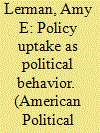| Srl | Item |
| 1 |
ID:
156702


|
|
|
|
|
| Summary/Abstract |
Partisanship is a primary predictor of attitudes toward public policy. However, we do not yet know whether party similarly plays a role in shaping public policy behavior, such as whether to apply for government benefits or take advantage of public services. While existing research has identified numerous factors that increase policy uptake, the role of politics has been almost entirely overlooked. In this paper, we examine the case of the Affordable Care Act to assess whether policy uptake is not only about information and incentives; but also about politics. Using longitudinal data, we find that Republicans have been less likely than Democrats to enroll in an insurance plan through state or federal exchanges, all else equal. Employing a large-scale field experiment, we then show that de-emphasizing the role of government (and highlighting the market's role) can close this partisan gap.
|
|
|
|
|
|
|
|
|
|
|
|
|
|
|
|
| 2 |
ID:
105202


|
|
|
|
|
| Publication |
2010.
|
| Summary/Abstract |
Contact with the criminal justice system is greater today than at any time in our history. In this article, we argue that interactions with criminal justice are an important source of political socialization, in which the lessons that are imprinted are antagonistic to democratic participation and inspire negative orientations toward government. To test this argument, we conduct the first systematic empirical exploration of how criminal justice involvement shapes the citizenship and political voice of a growing swath of Americans. We find that custodial involvement carries with it a substantial civic penalty that is not explained by criminal propensity or socioeconomic differences alone. Given that the carceral state has become a routine site of interaction between government and citizens, institutions of criminal justice have emerged as an important force in defining citizen participation and understandings, with potentially dire consequences for democratic ideals.
|
|
|
|
|
|
|
|
|
|
|
|
|
|
|
|